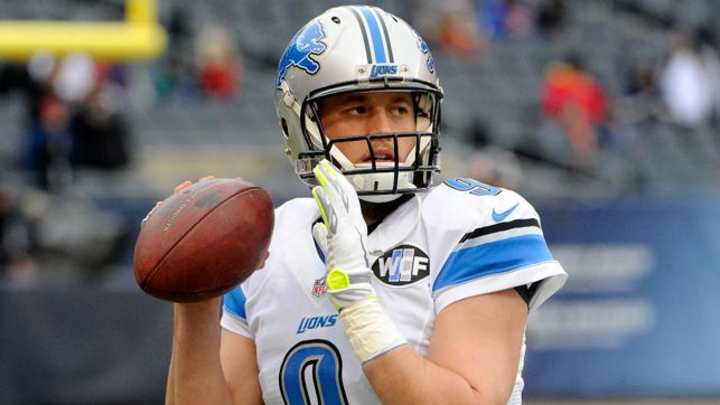Scouting Detroit: Adjusting to Life Without Megatron

1. The Lions’ offense will be simpler under new coordinator Jim Bob Cooter—and that’s a good thing. Cooter already laid some of this groundwork last season after he replaced Joe Lombardi in Week 8 and changed some of the Lions’ play-calling terminology right then and there. (That’s highly unusual.) Before Cooter, the Lions had committed the most turnovers in the NFL. Under Cooter, they committed the fewest. Turnovers can be a finicky stat, but the point endures: a simpler scheme might make an offense easier to defend, but the offense can offset this by being freed to play sounder and faster. Expect Cooter’s scheme to look a lot like the one Peyton Manning ran in Indianapolis. That means a limited array of formations, minimal presnap movement and an emphasis on the quarterback diagnosing defenses.
2. Putting the game more in Matthew Stafford’s hands is risky but necessary, given Detroit’s lack of talent on offense. Stafford has been sufficient but never great at reading the D and making snap decisions. However, he’s still prospered because he might be the best pure arm talent in football. Not only can he rifle balls through tight windows, he can do so from different throwing angles. Unfortunately, this has been a double-edged-sword throughout his career, as it’s led to some ill-advised decisions.
• BEHIND THE FACE MASK: Jaguars Safety Survived Armed Robbery, Kidnapping
3. The loss of Calvin Johnson could help tame Stafford. One reason Stafford developed a habit for making throws that few quarterbacks could, and even fewer should attempt, was his faith in a receiver who could make catches that most couldn’t. In his prime, Johnson drew designer coverages that defenses had often never shown before. (Though this mostly stopped being the case last season.) Therefore, Stafford had never seen those coverages. This presented some challenges. That won’t be the case anymore. But where the football gods giveth, they also taketh away. Detroit’s current so-so receiving corps will draw more conventional coverages, but Stafford must learn to exploit the nuances of those coverages. Peyton Manning dominated with a simple scheme in Indy because he learned not only which routes defeated which coverages, but at what point in the play a route would defeat a certain coverage. It’s hard to see Stafford becoming this cerebral.
4. Turbo quick running back Theo Riddick is Detroit’s best weapon. There isn’t a scarier out-of-the-backfield route runner in football. His 697 yards receiving last year led all running backs other than Danny Woodhead.
• LIONS CAMP: Turning Negatives into Positives
5. None of the analysis above matters if Detroit’s O-line doesn’t play better. Last season it was plodding and often overmatched mentally. Figure the simplified scheme can help fix the latter. For the former, the first-round selection of left tackle Taylor Decker could help, though he projects to be more of a mauler, which suggests a north/south style rushing attack. (Not the best fit for Riddick and Ameer Abdullah.) A lot hinges on whether 2015 first-round guard Laken Tomlinson can play quicker. And whether 2014 third-round center Travis Swanson can, too. (If he can’t, 2016 third-rounder Graham Glasgow will snatch his job.) A lot of questions up front. But questions are at least better than the answers Detroit had here last season.
6. The view of Detroit’s defense is a classic glass half full/half empty conundrum. The full: Ziggy Ansah, Devin Taylor and Haloti Ngata offer size and athleticism up front. All of the linebackers can run. Cornerback Darius Slay is a rising man-to-man defender. And safety Glover Quin is versatile, which you need in today’s NFL. The empty: only about half the contributing defenders are listed here. All the other guys have question marks.
7. That’s where coordinator Teryl Austin comes in. Austin ascended to head coaching candidacy in his first year on the job (2014) because he did an outstanding job with pressure calls in front of disguised coverages (especially coverages involving split safeties). He will have to do this again.
8. Cornerback Nevin Lawson and safety Tavon Wilson are the two most important players to Austin. If Lawson can be a sturdy No. 2 cover corner opposite Slay, the Lions will have options in their man-to-man calls. That means expanded options in their pressure designs, too. If—if—the former Patriot Wilson can be interchangeable, playing strong or free safety, then fellow safety Quin can go back to being the multidimensional contributor that he was in Houston. It’s a waste to just have Quin patrolling centerfield.
• FANTASY RANKINGS:QUARTERBACKS | RUNNING BACKS | WIDE RECEIVERS | TIGHT ENDS
9.Ziggy Ansah can be a top-three NFL defensive end—if he isn’t already. Few players have his combination of size (lanky size, at that) and bendability. Ansah gets off the ball explosively and closes even better.
10. Linebacker DeAndre Levy makes all the difference in the world for this defense. When he’s on the field, the Lions can be competitive against the run (even out of nickel). Plus, he provides great range as an underneath zone defender. Detroit’s other nickel linebacking contenders, Tahir Whitehead and Josh Bynes, are apt in this sense, as well, but they don’t have Levy’s anticipation and instincts. Few linebackers do.
Question? Comment? Let us know at talkback@themmqb.com
